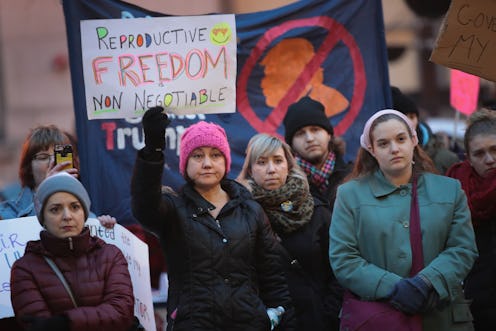News
Arkansas Judge Blocks Abortion Bill That Would Have Notified A Rape Survivor’s Attacker

Several weeks ago, a provision in Arkansas' 2017 legislative session demanded that pregnant women in Arkansas inform their sexual partner or family members in the case that they decided to have an abortion. The demand was stated in HB 1566, which is also known as the Tissue Disposal Mandate. The controversial provision stated that it would be illegal for a woman to go ahead with an abortion if she did not inform her sexual partner. However, a judge in Arkansas has blocked the abortion bill — including the provision that would make her decision known to the man who impregnated her.
The judge to issue an order against the provision was U.S. district court Judge Kristine Baker. Prior to the injunction issued by Baker, the American Civil Liberties Union (ACLU) and the Center For Reproductive Rights were also active in opposing the state's provisions on abortion. The ACLU had challenged the state's abortion bill while representing an abortion provider in Arkansas, Frederick Hopkins.
According to The Winston-Salem Journal, Baker justified her injunction and said, "The threatened harm to Dr. Hopkins and the fraction of women for whom the mandate is relevant clearly outweighs whatever damage or harm a proposed injunction may cause the State of Arkansas."
The Tissue Disposal Mandate is related to Arkansas' Final Disposition Rights Act of 2009. The law allots power to the relatives of a deceased person and allows them to decide what happens to the deceased person's body. Within the new provision, fetal tissue from an abortion was also categorized as a deceased person. On the issue of abortion, the provision would have given equal amount of power to both mother and father of the fetus.
Baker's injunctions were also ordered against other provisions in the bill. One injunction was against the bill's highly controversial requirement of physicians performing abortions for anyone under the age 14 to notify law enforcement agencies of the minor's residence. Prior to Baker's critical order, the provision would have taken effect on Tuesday.
Baker's decision to rule against the provisions was welcomed by pro-choice activists in the state of Arkansas. According to The Winston-Salem Journal, director of ACLU Arkansas Rita Sklar praised Baker's efforts and said that the women in the state "can feel a little relief." Sklar also criticized local politicians for passing laws "that defy decency and reason just to make it difficult or impossible for a woman to get an abortion."
In spite of support from local activists, Baker's ruling has ruffled feathers among the state's conservative lawyers. According to the spokesperson for Attorney General Leslie Rutledge, Rutledge disagreed with Baker's injunction and said that she planned on challenging it.